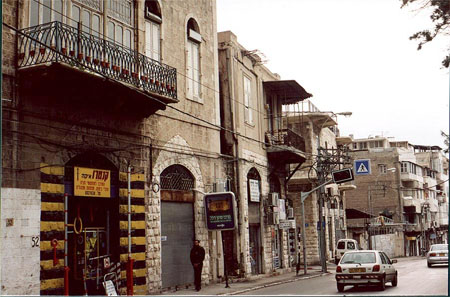
Photo: Jaffa Street Scene In 1948. www.palestineremembered.com
|
 Photo: Jaffa Street Scene In 1948. www.palestineremembered.com |
| Hikmet Bawab, Jaffa, April 8, 2000:
|
|
Hikmet lives in an apartment block near Andre's, similarly neither old nor new. She begins by saying that everything is fine, hamdillah, we live without problems, our life is good. I begin to fear that this will be the beginning and end of it. But she goes on to tell a story of hardship and difficulty, even personal unhappiness - but one on which she wishes to set an initial stamp of gratitude. She begins with her recollections of Sidon (Lebanon), only reveals later why she was there, and how she returned to Jaffa. Her father worked with an English shipping company in Akka. Because Hikmet's mother had only one son among six daughters, her father took them all by sea to Sidon, and rented lodgings for them in the old city. They stayed there nearly ten years, and he used to visit them from Akka on every 'a'eed' (feast). In 1956 they returned to Akka through the family re-unification programme.
Hikmet hated life in Akka, not just because of having to go to a new school and learn a new language (Hebrew), but because her father's character had changed. He had become a despot. Gradually I understood why those early years as refugees in Sidon could appear to Hikmet as years of happiness. Hikmet's husband was imprisoned when she was 26, and pregnant with their 6th child. She fed and educated the children through sewing. She couldn't give them university but all are working and married. She has 16 grand children already. No mention of her husband, whether he's living or dead. She tells me, "God gave one gift - 'duhukiyya' (the ability to laugh). This has helped me through difficult periods". I ask her about the effects of living in Israel on the Palestinian community. She says it has a bad influence on Arab girls -- they adopt cigarettes and fashions ('moda'), leave home -- luckily her daughters were not like this. Israel's bad influence on young men is phrased differently - "they have many psychological problems". Anxiety about |
the young, and fear that they are losing Arab morals and authenticity, is frequently expressed by Palestinians in Israel. Hikmet approves of state pensions but not of interference with the shari'a. Another criticism of the Israeli regime is this: "Bihedemu nas wa bia'lu nas" (it beats some people down, raises other people up) - social class differences within the Palestinian community are becoming deeper and more entrenched. Hikmet Bawab begins to speak: |
[April 6-9, Jaffa] ['Nadia al-Quds'] Copyright©2005 |
|